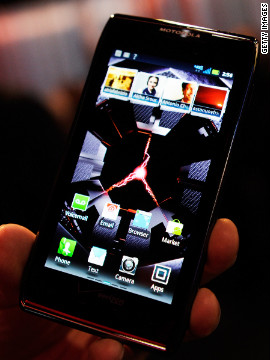 Apple had a interesting week in court seeing its patent infringement fight with Motorola tossed out, winning an injunction against Samsung’s Galaxy Tab 10.1 tablet, and hearing the ITC will review a ruling that could potentially lead to an iPhone and iPad sales block in the United States. It’s also the fifth birthday of Apple’s popular iPhone, and Mac OS Ken’s Ken Ray took a few moments to reminisce.
Apple had a interesting week in court seeing its patent infringement fight with Motorola tossed out, winning an injunction against Samsung’s Galaxy Tab 10.1 tablet, and hearing the ITC will review a ruling that could potentially lead to an iPhone and iPad sales block in the United States. It’s also the fifth birthday of Apple’s popular iPhone, and Mac OS Ken’s Ken Ray took a few moments to reminisce.
Posner’s Big Goodbye
The Apple versus Motorola case is officially over, at least as far as Judge Richard Posner is concerned.
AllThingsD says Judge Posner dismissed the case from his court last Friday, saying neither Moto nor the all-things-iMaker had been able to prove damages. Additionally the piece says Posner dismissed the case with prejudice, meaning they can appeal the case to a higher court, but they can’t come bother him with it again.
Quoting his ruling,
It would be ridiculous to dismiss a suit for failure to prove damages and allow the plaintiff to refile the suit so that he could have a second chance to prove damages … This case is therefore dismissed with prejudice; a separate order to that effect is being entered today.
And so, the piece says, “for Posner, Apple versus Motorola is finally over. But the companies’ pitched battle continues to rage on, with litigation pending in the
What the world needs now is another lawsuit between Apple and a competing smartphone maker. At least Apple legal thinks so.
And so, Electronista says, Apple last Thursday filed a lawsuit against Taiwanese phone-maker HTC in a Virginia court accusing the company of anticompetitive behavior and abuse of “fair, reasonable and non-discriminatory†licensing terms on standards-essential patents.
Hard to see how Apple could lose this one. According to Electronista, “The counterclaim … involves patents covering the “4G†LTE protocol … [that] have been described by HTC itself as standards-essential†in a complaint it filed against Apple last summer. HTC went on to claim “that Apple devices contain baseband chips that implement the LTE standard…†which sort of makes the technology sound “standards-essential.â€
No date has been set for the case against HTC in Virginia.
The ITC’s Do Over
While a U.S. without iPhones and iPads may seem unthinkable at this point in time, it’s not impossible. Well, it’s possible that new ones might have a hard time getting into the country.
Bloomberg says the U.S. International Trade Commission has agreed to review a ruling against Apple in a patent dispute between the Cupertino-company and Google subsidiary Motorola Mobility.
Earlier this year, ITC Judge Thomas Pender ruled that Apple did infringe a MotoMo-held patent relating to the industry standard for 3G technology used by most phones, and if this sounds familiar, it should. This was the patent infringement â€" or at least the type of patent infringement â€" Judge Richard Posner threw out of his court last week, saying Motorola couldn’t block sales of a product that used standards-essential patents.
Bloomberg says, “The U.S. Federal Trade Commission, members of Congress and Microsoft … have filed papers supporting Apple’s argument that import bans should not be imposed on such patents. Verizon Wireless, the largest U.S. mobile-phone service provider, and No. 2 AT&T … filed papers making similar arguments.â€
Should the ITC review go against Apple, the piece says it could lead to an import block on the iPhone and the iPad plus cellular. One hates to guess, but it seems more likely that they’ll just agree with everyone except Motorola Mobility instead.
A final ruling on the issue is expected on August 24th.
Denied: Galaxy Tab 10.1
Great big goings on in the Apple v. Samsung case.
AllThingsD says U.S. District Judge Lucy Koh has granted Apple’s request for a preliminary injunction against sales of the Samsung Galaxy Tab 10.1 in the states.
Quoting her ruling,
Although Samsung has a right to compete, it does not have a right to compete unfairly, by flooding the market with infringing products … While Samsung will certainly suffer lost sales from the issuance of an injunction, the hardship to Apple of having to directly compete with Samsung’s infringing products outweighs Samsung’s harm in light of the previous findings by the Court.
What’s interesting about that ruling: she didn’t used to think so.
A separate piece on the case from Electronista says Judge Koh denied Apple’s first request for a preliminary injunction against the device, though that decision overturned on appeal. But they didn’t actually issue the injunction, sending it back to her to do.
Court fights are funny.
Apple was happy to comment, with spokesperson Kristin Huguet saying, “It’s no coincidence that Samsung’s latest products look a lot like the iPhone and iPad, from the shape of the hardware to the user interface and even the packaging … This kind of blatant copying is wrong and, as we’ve said many times before, we need to protect Apple’s intellectual property when companies steal our ideas.â€
Samsung, on the other hand, not so happy to comment.
Things happened more quickly in the injunction case than just about anyone saw. Apple hadn’t said whether it would pony up the $2.6-million bond to make the preliminary injunction official, though it’s possible that they didn’t say because they were too busy doing it.
Putting up the money, I mean. Not… doing it.
From AppleInsider, “Almost immediately after the company won an injunction against Samsung’s Galaxy Tab 10.1, Apple posted the necessary $2.6 million bond to block sales of the iPad competitor in the U.S.â€
According to the piece, the money means the injunction is in effect. Samsung now has to cease sales of the tablet in the states or face sanctions for contempt of court.
Hello, Nexus 7
I’ve thought for a while now that The Telegraph out of the UK was down on Apple. Their headlines about the company always seem so negative. But I’m beginning to think it’s not Apple the paper is down on, but technology or tech companies in general.
Their headline about Google’s brand new Nexus 7 tablet: “Google tablet: an admission of failure against the Apple iPad.â€
I say, that glass is frightfully half empty.
Yes, Google did announce what some might refer to as an iPad killer, though it seems more immediately aimed at Amazon’s Kindle Fire or other Android-based tablets with its 7-inch form factor and its $199 sale price.
According to The Telegraph, the “Nexus†tablet is “an admission that Android has failed to make an impact on Apple’s iPad.â€
I’d love to give you a better idea of what the paper thought of Google’s Nexus tablet, but the bulk of the piece was devoted to what a suck-fest tablet makers besides Apple have made of making tablets.
So we’ll go to The Mac Observer, which says, “The device runs Android 4.1, called Jelly Bean, and it features a quad-core Tegra 3 processor and a 12-core graphics processor. The device has a resolution of 1280 x 800 … or 720p in high definition parlance.â€
It’s got an accelerometer, a gyroscope, a digital compass, a compass in the stock, and up to 8 hours of batter life. The piece says “It also includes near field communications (NFC) capabilities, and has a 1.2 megapixel front-facing camera.â€
While Asus is the tablet’s developer and manufacturer, the Nexus is being marketed as a Google device.
It’ll come with built-in access to all of content available through Google Play, including movies, TV shows, apps, ebooks, magazines, and music.
$199 for the 8-gigabyte model, though an extra 50-bucks’ll get buyers an extra 8 gigabytes. And, for a limited time, people who buy one will get a $25 credit good towards Google Play content, which most people forget Google actually sells.
Pre-orders began yesterday, with delivery expected to start in mid-July.
Happy Birthday, iPhone
And finally this week, it’s the 5th anniversary of the launch of the iPhone.
After months of build-up from its announcement at Macworld 2007, the lines were atrocious, the prices ridiculous, there was no app store… and boy did they go quickly.
I didn’t line up that first night. Ended up taking me two weeks to get my first iPhone.
We called it the “Jesus phone†and while we were kidding, I don’t think we were wrong. I can’t remember who said it first, but I do remember what they said: That in the world of mobile telephony we were looking at a BC/AD moment, when cellphones would be judged as before iPhone or after iPhone.
People said it was over priced. People said it would fail. Now try to find a smartphone that has not been shaped by it in some way.
Wanna talk money?
iMore has Strategy Analytics figuring that since its official launch five years ago, “Apple has generated $150 billion in revenue from their smartphone lineup.†And that does not take into account the iPod touch and the iPad, both of which owe most of what they are to what it was first.
Want some more staggering stats?
BusinessInsider has a few, like Apple’s iPhone business is now bigger than Microsoft. One part of Apple’s business â€" a large part, to be sure â€" but one part of Apple’s business. Bigger than Microsoft.
“The iPhone has destroyed at least three huge companies in the past five years, and has deeply wounded others,†according to the piece. “Thanks to the iPhone, Palm is toast. Research in Motion is toast. Nokia is toast. Microsoft is reeling. Formerly dominant global hardware makers like HP and Dell are reeling. The whole PC-industrial complex is reeling.â€
It’s created an entirely new industry and ecosystem, the App Economy, creating “jobs and careers for hundreds of thousands of developers, designers, and other professionals.â€
It has changed what people expect a phone to be, as I mentioned earlier, and it’s made Apple “the most valuable and profitable company in the world.â€
Not bad, for a five-year-old.
So, do that little guy a favor. Bake it a cake. And if you don’t know how, there’s an app for that. Make it a drink. And if you don’t know how, there’s an app for that. Take it someplace fun. And if you don’t know where, you know how to find it.
Or, if you really want to appreciate it, put it down for 24 hours. Okay 12 hours should be enough, actually. Okay, six. Okay, never mind. Try instead to remember what phones didn’t do before this one, even if you don’t have an iPhone
Then, if you do have an iPhone, hold it up to your face and sing happy birthday. Don’t worry about looking stupid. People will just think you’re singing to someone on the other end of the phone.
And if you haven’t named your iPhone, for Pete’s sake go ahead and do it. It’s five years old. It’s about time you give it a name.
Ken Ray has been in and out of tech news since 1998, writing, producing and presenting for the magazine “Global Technology Business,†BusinessRadio 1220/KBPA in San Francisco, TechTV Radio, and “Rob Black and Your Money†on KRON 4 in San Francisco. He hosts a few podcasts on Apple news and news related to Apple news, including “Mac OS Ken†since 2006, and the call-in show “Mac OS Ken: Live†since 2010. He also used to make bread pudding, but hasn’t in quite a while.




 Apple had a interesting week in court seeing its patent infringement fight with Motorola tossed out, winning an injunction against Samsung’s Galaxy Tab 10.1 tablet, and hearing the ITC will review a ruling that could potentially lead to an iPhone and iPad sales block in the United States. It’s also the fifth birthday of Apple’s popular iPhone, and Mac OS Ken’s Ken Ray took a few moments to reminisce.
Apple had a interesting week in court seeing its patent infringement fight with Motorola tossed out, winning an injunction against Samsung’s Galaxy Tab 10.1 tablet, and hearing the ITC will review a ruling that could potentially lead to an iPhone and iPad sales block in the United States. It’s also the fifth birthday of Apple’s popular iPhone, and Mac OS Ken’s Ken Ray took a few moments to reminisce.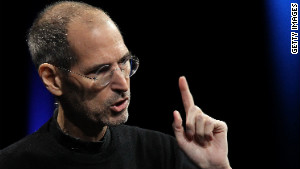

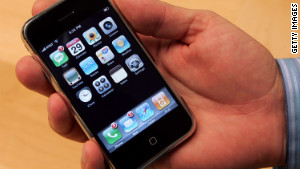
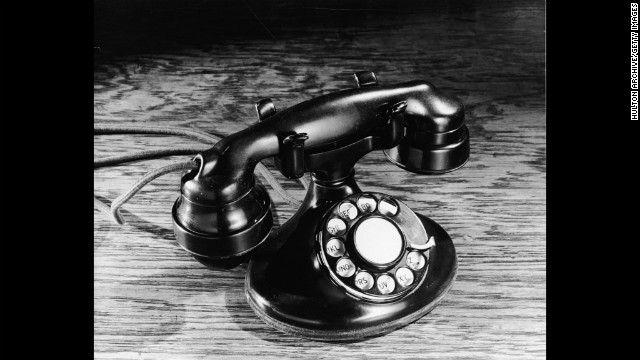 The telephone has come a long way from the 1930s, when rotary dial models such as the one pictured here were popular, to the iPhones and BlackBerrys we carry today. Click through to see a visual history of the telephone.
The telephone has come a long way from the 1930s, when rotary dial models such as the one pictured here were popular, to the iPhones and BlackBerrys we carry today. Click through to see a visual history of the telephone. 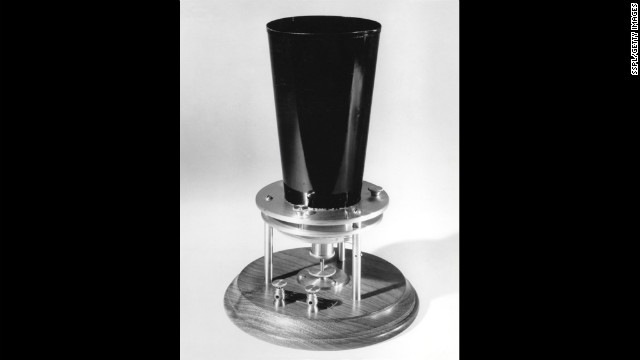 Alexander Graham Bell invented the liquid transmitter circa 1876.
Alexander Graham Bell invented the liquid transmitter circa 1876. 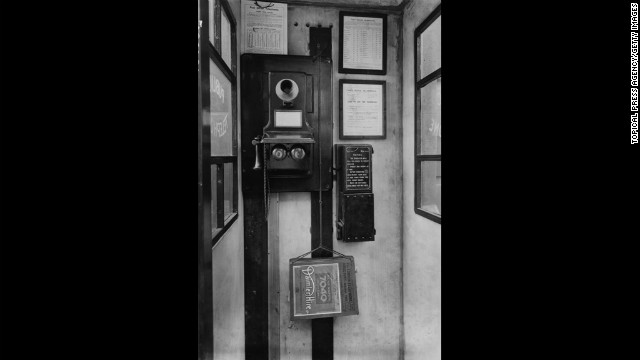 This phone box in Southwark Bridge, London, features a wall-mounted phone with separate mouthpiece and receiver from 1924.
This phone box in Southwark Bridge, London, features a wall-mounted phone with separate mouthpiece and receiver from 1924.  The rotary phone in this 1930s Reading, Pennsylvania, police box could be usd to summon police, ambulance or fire services at a moment's notice.
The rotary phone in this 1930s Reading, Pennsylvania, police box could be usd to summon police, ambulance or fire services at a moment's notice. 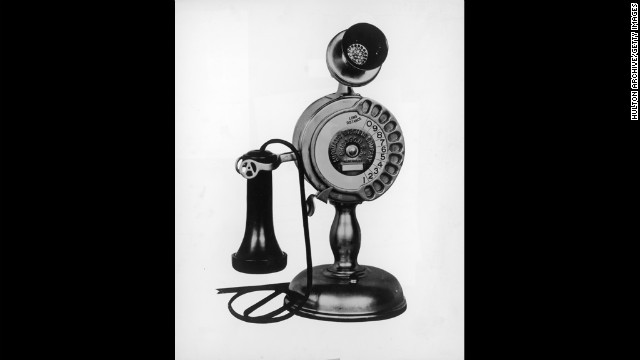 Rotary dial telephones with separate mouthpieces and receivers are commonly reffered to as "candlestick" phones. This model from the mid-1930s features the rotary dial in the shaft of the telephone, rather than the base-dial models with which most people are familiar.
Rotary dial telephones with separate mouthpieces and receivers are commonly reffered to as "candlestick" phones. This model from the mid-1930s features the rotary dial in the shaft of the telephone, rather than the base-dial models with which most people are familiar. 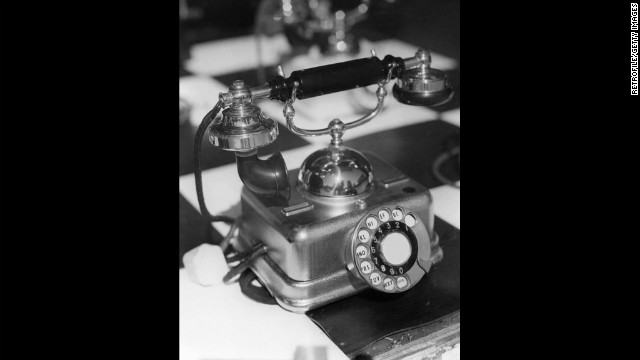 This 1950s rotary phone features an attached mouthpiece and receiver.
This 1950s rotary phone features an attached mouthpiece and receiver. 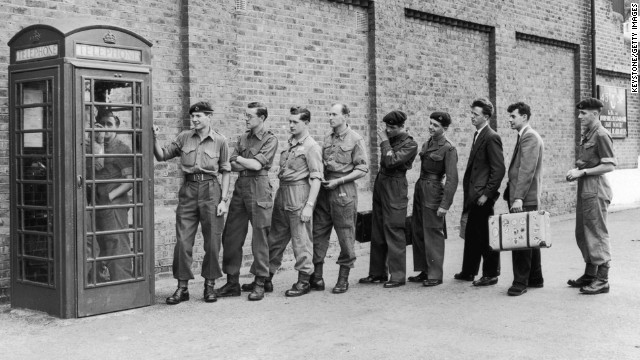 Men of the English Oxfordshire and Buckinghamshire Light Infantry call their loved ones after being told to prepare for duty in the Suez Canal Zone in 1956. Payphones were common up until the cell phones became popular and affordable.
Men of the English Oxfordshire and Buckinghamshire Light Infantry call their loved ones after being told to prepare for duty in the Suez Canal Zone in 1956. Payphones were common up until the cell phones became popular and affordable. 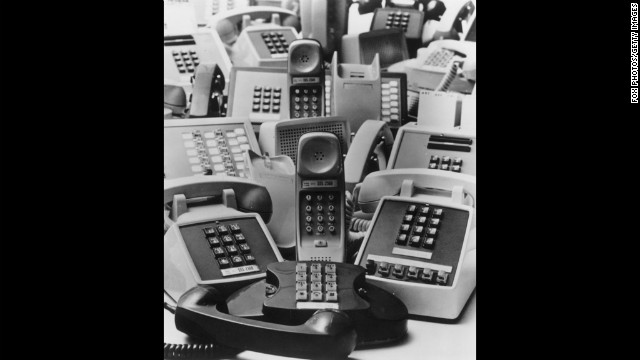 Some of the first push-button phones are pictured here in 1971.
Some of the first push-button phones are pictured here in 1971.  Franck Piccard of France talks on his mobile phone after the Mens Super G Slalom event at the 1988 Winter Olympic Games in Calgary, Alberta.
Franck Piccard of France talks on his mobile phone after the Mens Super G Slalom event at the 1988 Winter Olympic Games in Calgary, Alberta. 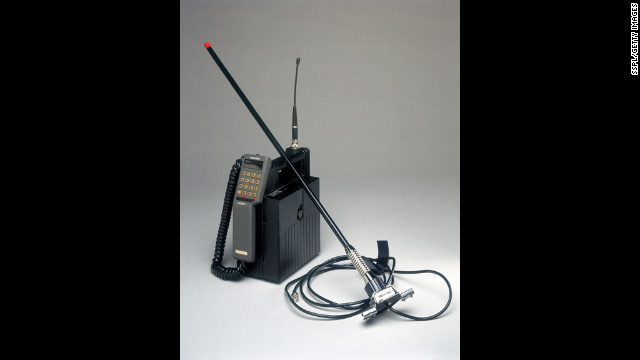 This model of mobile phone was marketed by Racal-Vodac Limited of Newbury, Berkshire, England, in 1997, to serve dual roles as a mobile unit installed in a car or as a portable unit. The unit was sold with a battery charger and extension antenna for use in areas with poor reception.
This model of mobile phone was marketed by Racal-Vodac Limited of Newbury, Berkshire, England, in 1997, to serve dual roles as a mobile unit installed in a car or as a portable unit. The unit was sold with a battery charger and extension antenna for use in areas with poor reception. 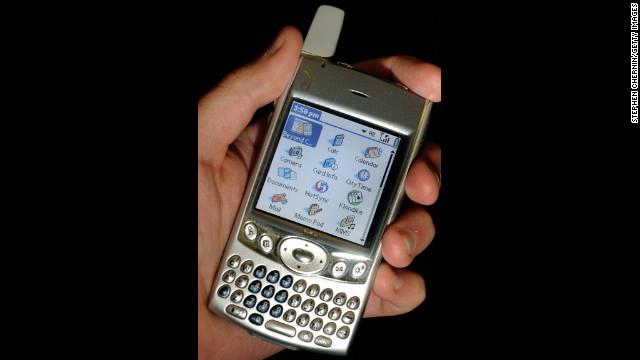 Cell phone manufacturers made great strides between 1997 and 2004. The Palm Treo 600 smartphone, pictured here in 2004, integrated telephone with e-mail and Internet browsing capabilities.
Cell phone manufacturers made great strides between 1997 and 2004. The Palm Treo 600 smartphone, pictured here in 2004, integrated telephone with e-mail and Internet browsing capabilities. 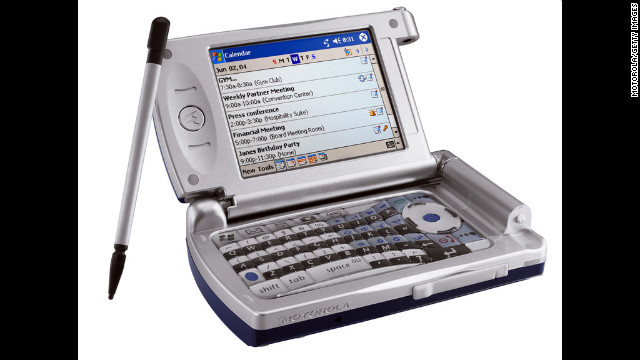 Motorola's MPx wireless device, released in the second half of 2004, took the smartphone to a new level with Wi-Fi capabilites and a fully functional keyboard.
Motorola's MPx wireless device, released in the second half of 2004, took the smartphone to a new level with Wi-Fi capabilites and a fully functional keyboard. 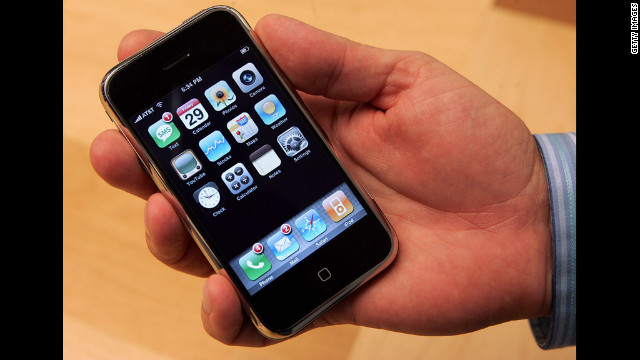 The first generation Apple iPhone, released on June 29, 2007, had people lining up for days before and after its release. It was an advancement in the world of smartphones, incorporating a touchscreen, apps, telephone, e-mail and a host of other features.
The first generation Apple iPhone, released on June 29, 2007, had people lining up for days before and after its release. It was an advancement in the world of smartphones, incorporating a touchscreen, apps, telephone, e-mail and a host of other features. 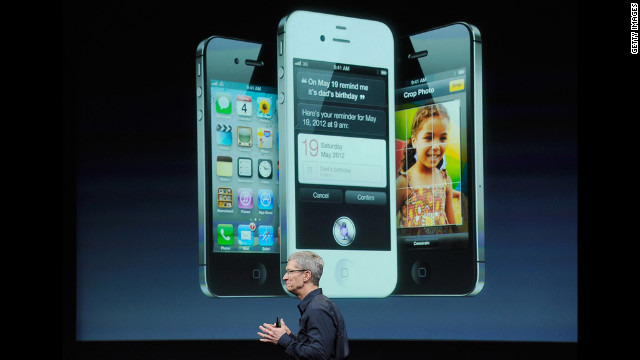 The iPhone 4S, released on October 14, 2011, expanded on the iPhone's innovations with the addition of groundbreaking retina diplay technology and SIRI.
The iPhone 4S, released on October 14, 2011, expanded on the iPhone's innovations with the addition of groundbreaking retina diplay technology and SIRI. 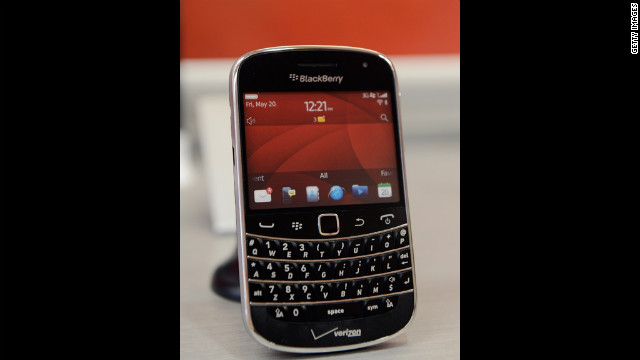 The BlackBerry Bold 9930, shown here, continues a long line of BlackBerry devices so popular they have commonly been dubbed "crackberries." They are also popular smartphones for business applications because of their fully functional keyboards and advanced e-mail capabilities.
The BlackBerry Bold 9930, shown here, continues a long line of BlackBerry devices so popular they have commonly been dubbed "crackberries." They are also popular smartphones for business applications because of their fully functional keyboards and advanced e-mail capabilities. 